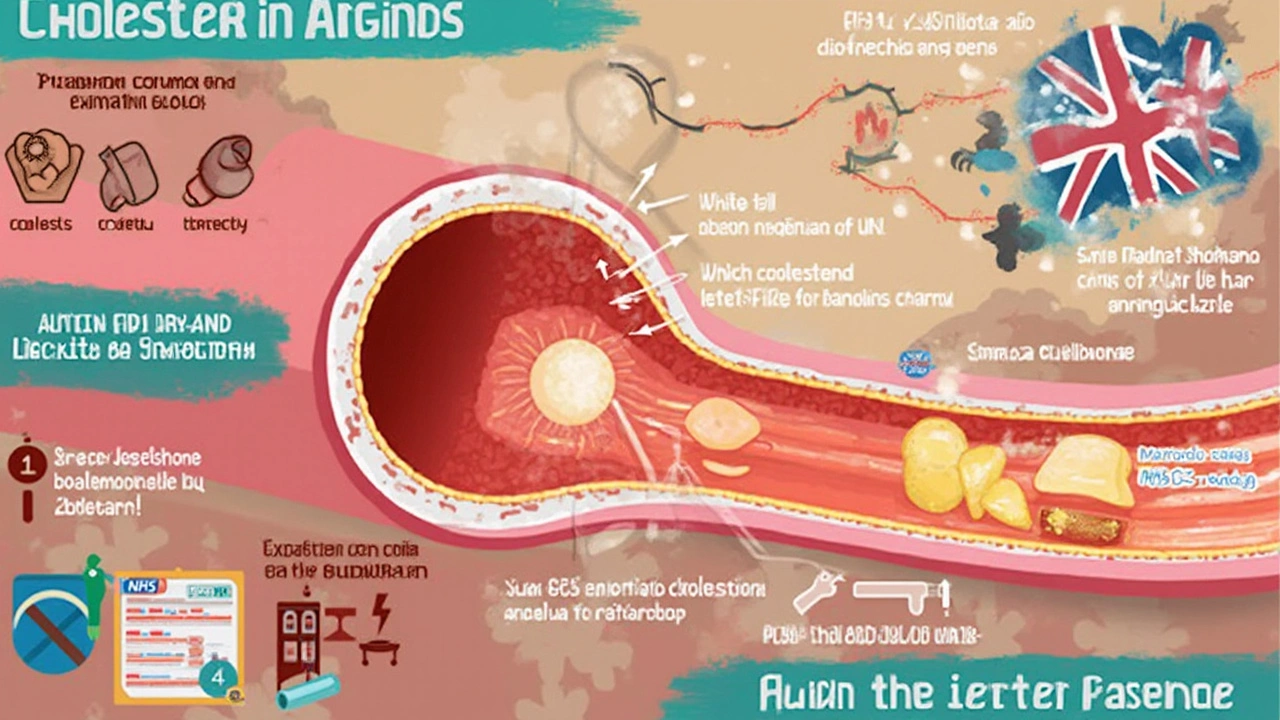Imagine getting a pill that comes with a tag line: "Double action, one tablet." That's Vytorin—an interesting blend of two well-known cholesterol fighters: simvastatin and ezetimibe. Most people hear "cholesterol medicine" and picture one chemical hard at work. Vytorin shakes things up with a tag-team approach: one drug pulls cholesterol from your blood, the other blocks it from even getting in from your food. Doctors have been prescribing it for more than a decade, but its story is packed with twists, marketing battles, and real-world questions. Sometimes, the conversation about cholesterol drugs can sound like a wall of medical babble, but the truth is, millions of folks out there are just trying to figure out what might actually work for their heart, and what’s going to mess with their day-to-day life.
What Is Vytorin and How Does It Work?
Most people start with diet and exercise when they hear the words "high cholesterol." But when grilled cheese cravings keep winning, or genes just aren’t on your side, pills like Vytorin come into play. Here’s the interesting thing: Vytorin isn’t just another statin like Lipitor or Crestor. It’s actually two drugs bundled together—a smart move for those battling stubbornly high cholesterol.
So, how does this little tablet go to work? Vytorin mixes simvastatin and ezetimibe. Simvastatin, from the statin family, tells your liver to chill out on cholesterol production. Ezetimibe, totally separate, stops your gut from absorbing so much cholesterol from food. Most cholesterol in your body doesn’t actually come from your plate (super weird, I know), but blocking that smaller percent with ezetimibe tacks on some extra benefit. The result? People who don’t quite hit their cholesterol goals with a single drug might just see bigger changes when both mechanisms are teamed up.
This combo was first approved back in 2004, and it’s been through a lot since. Doctors often reach for it in folks with high LDL cholesterol—think “L” for “lousy”—especially if other attempts fell short. The idea is to hit LDL hard enough to make a dent in future heart attack or stroke risk. But the world of cholesterol meds is competitive, with tons of options, and every year brings new headlines about side effects, costs, and which meds really help in the long run.
The science behind the combo isn’t just hype. Large trials (like the IMPROVE-IT study) placed Vytorin next to regular ole’ statin therapy in people who already had heart disease. The combo lowered LDL more, no surprise there, but it also showed a slight bump in reducing heart events—a big plus, even if it isn't headline-making dramatic. Still, when you’re playing the odds with your health, “slightly more” can mean a lot over a lifetime.
People often ask, "Why not just crank up the dose of a regular statin instead of using two meds?" Higher statin doses—think simvastatin 80 mg—actually increase side effects like muscle aches or, in the rare case, serious muscle breakdown. Vytorin lets many reach their target LDL with a lower statin dose plus the ezetimibe boost, so they dodge some side effect landmines.
Here’s another fun fact: Vytorin also comes in different strengths, because not everyone’s cholesterol problem is the same size. Upshot? More ways for your doctor to mix and match, aiming for the sweet spot between effectiveness and tolerability. If your numbers are through the roof, you may start higher; if you’re closer to goal, you may just need a tiny nudge.

Who Should Take Vytorin (and Who Absolutely Shouldn't)?
With cholesterol meds, there’s no “one size fits all.” Vytorin works best for adults whose LDL numbers stay high even after changes in food, exercise, and sometimes single-drug statin treatment. It also comes up when people can’t tolerate higher statin doses—a surprisingly common problem among people in their forties and beyond.
Families dealing with genetic cholesterol disorders (like familial hypercholesterolemia) sometimes get a fast pass to combo therapy early on. If you’re sitting in a doctor’s office getting grilled about your family tree, this is probably why—they’re trying to figure out if your high cholesterol is just too stubborn for the basics.
Here’s where you absolutely, positively avoid Vytorin:
- You’re pregnant, or might become pregnant. Statins are a no-go—too risky for development.
- You have active liver disease, especially with enzyme tests through the roof.
- You have a history of serious muscle problems from statins.
- You’re under 18, except in the rare hereditary cholesterol cases (and even then, it's tightly managed).
It’s not just a “doctor’s orders” thing—insurance companies usually keep tight reins on who can get Vytorin because it’s pricier than many single-drug generics. Before starting, expect some hoops: bloodwork to check your cholesterol, liver function, and sometimes even a screening for other medications you’re taking (because Vytorin might butt heads with drugs for infections, blood pressure, or mood issues).
There's another curveball: food and supplements. Grapefruit can mess with simvastatin levels (your pharmacist will give you the side-eye if you mention daily grapefruit juice), and even vitamins or herbal pills could make things risky. If you take a big stack of supplements (looking at you, red yeast rice lovers), always get a med check with a professional.
A lot of people are wary about trying another pill for their heart. A 2022 survey of patients starting a new cholesterol combo med showed that nearly half had lingering fears about "statin side effects" from stories they’d read online. This is where a real talk with your doctor—or even a second opinion—can help unpack what's myth and what's proven risk.
If you’re still wondering if Vytorin is for you, ask yourself:
- Did I already try lowering LDL with lifestyle or single-drug statins, but didn't hit target?
- Do muscle aches or other statin side effects keep showing up every time I try?
- Did my doctor say my cholesterol is due to genetics?
- Am I taking meds or supplements that could interact with my cholesterol treatment?
Anyone sitting there checking off yes to more than one is probably right in the Vytorin "sweet spot." Still, nothing beats a real conversation where risks, benefits, and alternatives are actually covered and not just rattled off a script.

Living with Vytorin: Real Stories, Side Effects, Tips, and What to Expect
No one likes reading a list of side effects, but people ask about them more than anything else. Here’s what actually tends to come up, based on real patients and actual published data—not just the scary list on the package insert.
The classic trouble with statins is muscle aches. With Vytorin, some folks notice stiffness or tiredness in larger muscle groups (think legs after a long walk), but it’s not guaranteed. Most who get this side effect feel it in the first couple of months, not right away, and it's rarely severe enough to make them quit. Labs can help double check that nothing serious is brewing, especially if you feel way more run-down than usual. If you get severe unexplained pain or dark urine, that’s the STOP signal—call your doc pronto.
Ezetimibe, the non-statin half, is pretty chill in terms of side effects. Maybe some belly upset or gassiness, but most people don’t even notice. Occasionally, liver enzymes can creep up, so those periodic blood draws aren’t just for the doctor's peace of mind. Allergic reactions are rare but possible—you’d know if it happened, trust me.
Now, for the numbers. Most people see their LDL drop by 25-60%, depending on their starting point and dose. That’s a big swing, and for some, it’s just what the doctor ordered to stay below that "danger zone." Keep in mind, though, that numbers can creep up if you go off the rails with food or forget doses regularly.
So, how can you make life with Vytorin easier? Here are a few real-world hacks:
- Take Vytorin in the evening. Your body makes more cholesterol at night, so you’ll get more bang for your buck at bedtime.
- If you feel muscle pain, jot down when it happens, what you were doing, and if it gets worse after workouts. Bring that log to your next appointment.
- Remind yourself with a sticky note on the bathroom mirror or set a recurring phone alarm—missed doses mean missed progress.
- Keep your regular bloodwork appointments. It’s not just red tape; it can catch sneaky problems early.
- Double check with your pharmacist or doctor anytime you start a new prescription or even an over-the-counter supplement.
- Avoid grapefruit like the plague if you’re on simvastatin. Don’t want your cholesterol to drop only to get hit with preventable side effects.
Many patients worry about long-term risks: Can Vytorin mess with memory or cause diabetes? In big studies, there’s no trustworthy evidence that it will fry your brain or wreck your sugar levels. Still, people with borderline diabetes should tell their doc, just in case. Most get peace of mind once they see their numbers improve and nothing strange turns up in routine monitoring.
There are stories from real people who stuck with Vytorin and finally saw their cholesterol goals met—for the first time—in years. These aren’t outliers. Sometimes, what tips the balance isn’t just the combo drug, but a little change in daily routine: swapping one salty snack for something else, actually dragging yourself to evening walks, drinking a bit less alcohol, or just being consistent with pills.
Want your cholesterol med to really pull its weight? Don’t think of Vytorin as a free pass to eat what you want. People who treat the pill as a sidekick to better habits end up with fewer regrets and better numbers. You know your body best, so trust how you feel—and never be afraid to check in with a pharmacist or doctor about new symptoms or worries. Vytorin isn’t magic, but for a lot of people, it’s a solid next-step move for a healthier heart and mind.

Pamela Clark
May 27, 2025 AT 05:03
Oh, because we all needed another overpriced cocktail to pretend we’re doing something profound for our arteries.
Diane Holding
May 28, 2025 AT 03:17
Take the medication exactly as prescribed and schedule liver function tests every three months to catch any issues early.
Cheyanne Moxley
May 29, 2025 AT 01:30
Honestly, it’s shameful how many people pop a pill and then think they’ve earned a free pass to binge on junk food.
Kevin Stratton
May 29, 2025 AT 23:43
We chase the illusion of control over our bodies, yet the night‑time cholesterol synthesis reminds us that some processes are inherent 🌙🙂.
Manish Verma
May 30, 2025 AT 21:57
In my country we’ve seen the best outcomes when patients stick to a guideline that favors combo therapy early – it’s not just a marketing gimmick, it’s solid science that our doctors trust.
Lionel du Plessis
May 31, 2025 AT 20:10
Pharmaco‑kinetic synergy yields LDL reduction efficacy beyond additive baseline metabolic pathway inhibition
Andrae Powel
June 1, 2025 AT 18:23
It's understandable to feel uneasy when a new medication is added to your routine.
Many patients report a mild soreness in muscles during the first few weeks, which often subsides as the body adapts.
If the discomfort persists beyond a month, bring it up with your clinician for a possible dose adjustment.
Keeping a simple log of when you take Vytorin and any symptoms you notice can be incredibly useful at appointments.
Blood work should be checked at baseline, then roughly every 12 weeks, to monitor liver enzymes and creatine kinase levels.
While the simvastatin component can interact with grapefruit juice, a small amount usually isn’t harmful, but avoid large daily servings.
Ezetimibe is generally gentle on the stomach, but if you experience persistent nausea, discuss timing the dose with food.
Remember that the medication works best when paired with consistent lifestyle changes, such as moderate exercise and a heart‑healthy diet.
If you have a history of diabetes, ask your doctor whether the modest increase in blood sugar seen in some studies is relevant for you.
Should you notice dark urine or unexplained fatigue, seek medical attention promptly as these can signal rare but serious side effects.
Many people find that taking the tablet at bedtime aligns with the body’s nocturnal cholesterol synthesis, enhancing efficacy.
Don’t feel pressured to consider the pill a license to indulge in fried foods; your arteries will thank you for moderation.
It’s also wise to review all over‑the‑counter supplements with your pharmacist, since some can affect statin metabolism.
Supporting your heart isn’t just about a single drug; it’s about a holistic approach that includes stress management.
Stay in touch with your healthcare team, and you’ll likely see steady progress toward your LDL goals without unnecessary anxiety.
Leanne Henderson
June 2, 2025 AT 16:37
Wow!!! You’ve got this!!! Remember to set a nightly alarm for your dose!!! And keep a tiny notebook by the bedside to jot every little ache that shows up!!! It’s all about the patterns!!!
Megan Dicochea
June 3, 2025 AT 14:50
Check your med interactions especially with antibiotics and blood pressure pills it’s easy to miss something and cause trouble
Jennie Smith
June 4, 2025 AT 13:03
Let’s fire up those heart health goals with a splash of optimism – imagine your LDL numbers dropping like the beat in a drum solo, you’ve totally got this!
Greg Galivan
June 5, 2025 AT 11:17
Stop ignorng the side effect warnings they are real and you cant just brush them off like a minor inconvenience
Anurag Ranjan
June 6, 2025 AT 09:30
Follow up with your doctor if any lab values drift; early action prevents bigger issues.